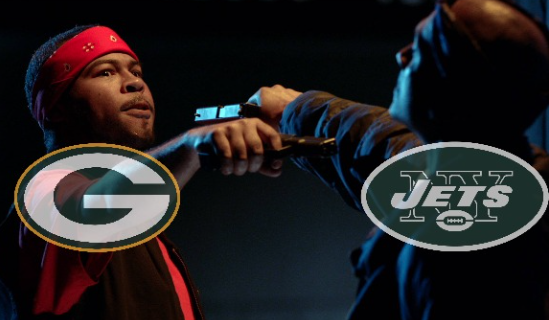
The Green Bay Packers and the New York Jets are stuck in a peculiar situation, each of them want to make the deal, but both teams are acutely aware of the rising desperation the other team is feeling and are determined to get the most from them. Of course we are talking about the inevitable Aaron Rodgers trade to the Jets, but the details in making such a trade are not simple.
The Jets’ Case
The New York Jets should go into all negotiations feeling good about their chances to force the Packers to take a very Jets friendly deal. The first main thing they will point out is that the Packers have already shown their hand, they do not want to have Aaron Rodgers return to their team, they would much rather trade him and move onto Jordan Love. Packers CEO Mark Murphy and general Manager Brian Gutekunst have both confirmed the sentiment that the Packers will move on and build around Love. Of course the Jets know this and will consistently remind the Packers that they’re taking on a player who the Packers do not want back. The next huge piece of leverage the Jets have is that no other teams, at this point in the offseason, are interested in trading for Aaron Rodgers. So the Jets can lowball the Packers and leave the team with the decision of accepting the Jets offer and getting some return (even if it’s disappointing) or getting no draft compensation, and bring back Rodgers (who’s contract massively hinders the Packer’s salary cap) which will create a media circus and potentially a Jordan Love trade demand when Rodgers shows up to training camp. Which is a very strong argument.
The Packers’ Case
The Green Bay Packers should also go into negotiations feeling good about their chances to force the Jets to take a very beneficial Packers deal. The first thing they will point out is that the Jets have gone all in on Aaron Rodgers and they have no other back up plan readily available. Before free agency started, the Jets could bluff that they would sign other veteran quarterbacks like Derek Carr or Jimmy Garappollo, but those options are no longer on the table. If the Jets do not end up with Aaron Rodgers, and are stuck with incumbent quarterback Zach Wilson as their starting quarterback in 2023 (who their head coach called their QB2) it would be a huge organizational failure. Which if the Jets then struggle again, could easily cost jobs to the head decision makers. Ultimately, the Packers are selling the Jets that their entire 2023 season rests on being able to make the trade for Aaron Rodgers, and if they do get him they now could compete for a Super Bowl. The fact that the Jets’ 2023 season, and whether or not they are competitive, seemingly teetering on whether they land Aaron Rodgers; combined with the organization making it clear that they plan to trade for Rodgers and they do not have any obvious backup plans, gives the Packers a very strong argument of their own.
The Uniqueness
What makes this so unusual is that both sides want to (arguably need to) make this deal, but they both have very strong arguments for why the other side should cave to their demands. Even in other situations usually one side is under the gun much more. For example, when Anthony Davis demanded a trade from the Pelicans to the Lakers, you could argue both sides wanted to make the deal too. The Pelicans wanted to rebuild and get as much back from a disgruntled player as they can, and the Lakers wanted to get a co-star for Lebron James to win a title. On the surface it seems like a similar situation, one team doesn’t want to bring back a star and another wants him, it’s exactly why trades happen. But the more you dig into the comparison, the more different the situations are. The Pelicans were under no real stress to trade Davis that offseason, they could have waited all the way to the trade deadline and they would still get a very good trade package in return, while situating their team for a rebuild. Oppositely, the Packers have plans to move on and compete with Jordan Love, so bringing back Rodgers is disruptive at best and season altering distractions coupled with a Jordan Love trade demand at worst. On the other hand, you could say the Jets and Lakers are both adding a huge piece to try to take the team over the top, so that side of the trade is similar. Again this comparison falls apart with more inspection. While the previous statement is true, circumstances around them are completely different. The Lakers could always add other complementary pieces around Lebron, while the Jets have no other good quarterback options, leaving them desperate to do this deal. Another difference is the Lakers still had to outbid any other team looking to swoop in to add super star Anthony Davis, whereas the Jets know they are the only team putting offers on the table for Aaron Rodgers.
An Extra Sticking Point
What makes a complicated situation more complicated, is Aaron Rodgers’ age. He is 39 years old and might only play one more year before retiring, which puts the Jets in a delicate situation. If it was already hard to balance between giving up a lot for a quarterback you need, and not not betting against yourself and driving up the price, when you’re the only team putting out offers. Now they have to also worry about getting the new quarterback for potentially only one year. After all, Aaron Rodgers did say that he was 90% retired before he went into his darkness retreat and decided to play another year. If the Jets knew Rodgers would be on the team for three to four years, giving up higher draft picks makes sense but without that guarantee it adds an extra level of confusion and negotiation that needs to be worked out. Do the Packers give back certain picks if Rodgers retires after only one year? Do the Jets give the Packers more picks for every extra year that Rodgers plays? Or do the Jets give up a little less because there is the built in risk of imminent retirement? The risk versus reward scale for the Jets changes drastically depending on how many years Rodgers plays. Which also changes how much they would be willing to give up for him. This is a huge factor which makes this deal very hard to complete and I would be very surprised if, in the final deal, there aren’t conditional picks depending on how many years Rodgers ends up playing.
The Ending
Ultimately, this is a good old fashion mexican standoff, but I do think this will eventually get done. Simply because both teams need it to get done, that doesn’t mean both teams will put aside everything and happily work together. But it does mean that unless something drastic happens, they will both begrudgingly loosen their demands to a point of a deal. Now that might not be in the next day, week, or even two weeks, but eventually it’ll get done and Aaron Rodgers will be a Jet because that is what both teams want. But right now they are in the middle of the most evenly matched quarterback standoff of all time, and they are still staring each other down hoping the other team blinks.
